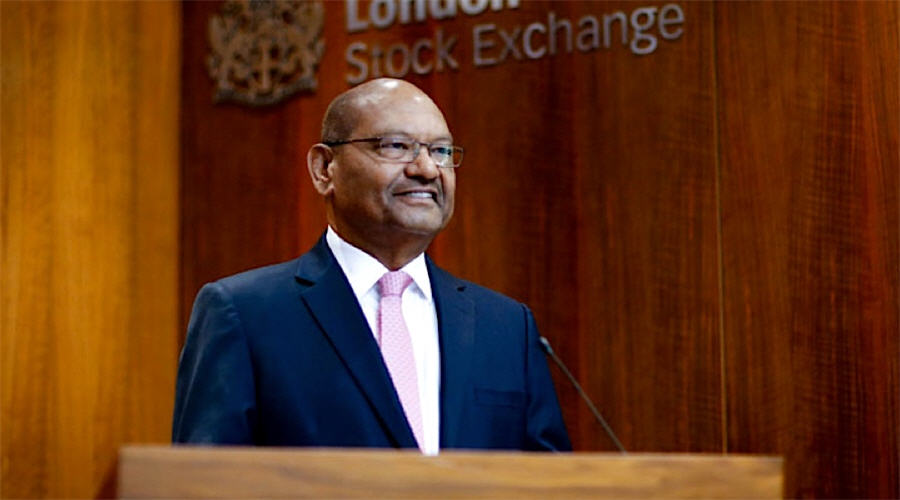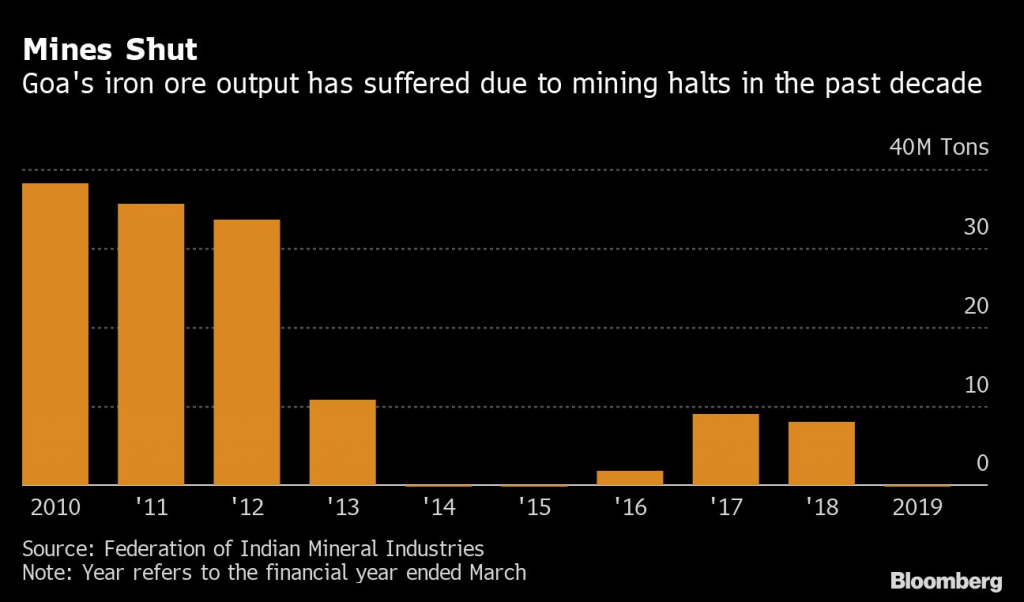
With Goa’s fabled beaches emptied by a nationwide lockdown to fight the coronavirus, the Indian state is about to witness an epic battle at the heart of the trade-off between reviving the economy and protecting the environment.
On April 21, India’s Supreme Court is scheduled to begin hearing a plea by billionaire Anil Agarwal’s commodities giant Vedanta to restart iron ore mining in the nation’s smallest state, known for its palm-fringed beaches and 16th century Portuguese churches. The move has the support of prime minister Narendra Modi’s government, which was concerned about an economic slump in Goa even before the virus. Pramod Sawant, the state’s chief minister and a member of Modi’s party, has made resumption of mining his policy priority.
On the opposite side is the non-profit Goa Foundation, an environmental group that since 1992 has fought legal cases that have halted or curbed mineral extraction on and off in the state on the grounds of environmental damage and corruption. Those efforts culminated with a ruling by the top court in 2018 to cancel all existing mining leases in Goa.
The court’s next ruling is critical for Vedanta, which had to shutter its copper smelter in 2018 due to deadly protests and has seen its shares slump 48% this year as the coronavirus slammed economies around the world. The company, which has 10 iron ore leases in Goa and also operates mines in neighboring Karnataka, declined to comment as the legal case is ongoing.
If the court rules in the company’s favor, mining operations in Goa could recommence as soon as the monsoon season ends in October as the industry is normally shut during the rains, raising iron ore supplies in the world market at a time when miners are set to raise output even as steelmakers cut operations as economies stall because of the virus.
Goa still holds vast deposits of about 1 billion tons of the ore buried in hills in the east of the state that also include wildlife reserves along the border with neighboring Karnataka. Before the disruptions began in 2012, iron ore contributed a quarter of Goa’s revenue and the state provided as much as half of India’s exports of the steelmaking raw material.
Since then, the shutdowns have wreaked havoc with the state’s finances. Goa’s public debt has more than doubled since 2013, to about 180 billion rupees, according to government documents. To help offset the loss in revenue, Sawant raised taxes on alcohol and on some land purchases. The Goan government didn’t respond to emailed queries about the mining industry.

The mining stoppage has “turned a fairly prosperous state into a stagnant, impoverished and sluggish economy,” said Ambar Timblo, president of the Goa Mineral Ore Exporters’ Association, which estimates the closures have cost state and central governments 70 billion rupees in revenue in the last two years.
With governments around the world desperately seeking ways to limit the economic slump, Goa’s chance to restart one of its biggest revenue earners would seem to be a priority. But the Goa Foundation has had success in the past in making sure rules are tightened to curb pollution and illicit extraction.
Some 139 mines in the state were shut in September 2012 on a petition filed by the foundation after a federal-government panel said rampant illegal mining had siphoned off an estimated 349.4 billion rupees ($4.7 billion). Toxic waste had polluted rivers and farmland and forest habitats had been destroyed. The ban was lifted two years later with new checks and balances and an annual production cap of 20 million tons.
Then in 2018, the Supreme Court canceled the leases of 88 operating mines that had been renewed by the state government following another plea by the Goa Foundation, saying their renewal by the government was “unduly hasty.” The judges told the government to issue fresh leases and environmental clearances that ensured the Goan people’s right to clean air and protected the natural habitat. The judgment cited novelist Ayn Rand, saying “we can evade reality, but we cannot evade the consequences of evading reality.”
The court’s next ruling is critical for Vedanta, which had to shutter its copper smelter in 2018 due to deadly protests
Rahul Basu, research director at the Goa Foundation, said the group isn’t against the extraction of ore, but wants it to be mined sustainably and the proceeds to be distributed to the state’s populace. “Both the minerals and the environment are an inheritance,” Basu said by phone from Goa. “We must ensure that future generations inherit either the minerals or their value.”
In 2014, the foundation spearheaded the Goenchi Mati Movement, or Goa’s Earth movement, to advocate mining reforms that would protect the environment, tackle corruption and ensure the mineral wealth benefits future generations. Goa has seven national parks and wildlife sanctuaries, including Bhagwan Mahavir, a vast reserve close to mining areas in the east of the state that is home to hornbills, pangolins and rare black leopards.
But as the mines stayed shut, the economic consequences mounted.
The latest stoppage cost more than 100,000 mining jobs in Goa, and 300,000 more in supporting industries, including truck drivers, mechanics, hotel staff, food vendors and banks, according to the Federation of Indian Mineral Industries. That’s equivalent to more than a quarter of the state’s 1.46 million people.
The result is that per-capita income in the state has been cut by about half, from 375,554 rupees, according to a report by think-tank Goa Livelihoods Forum. It said the stoppage “has also led to major loss of investor confidence which would have a long-term negative impact on Goa’s economy.”
More than 12,000 trucks and 150 barges and ancillary units have been idled. Total exports from the state’s only major port, Mormugao, fell to 4.36 million tons in 2018-19 from 12.45 million tons the year before.
The state government has tried to help, giving a total of 955 million rupees since 2014 to operators of barges, mining machinery and dump trucks, who were in financial distress due to the closures, according to the state. But the Goa Foundation and trade unions say hardly any help has trickled in after 2016.
“Those who lost their jobs have been spending from their savings or selling their possessions as they wait for the work to resume,” Puti Gaonkar, president of the Goa Mining People’s Front, said by phone from the town of Ponda in Goa. “Many had taken loans for buying trucks to transport the ore by mortgaging their houses and jewelry and now these have been attached by banks and the trucks are rusting.”
“Everyone is waiting for the Supreme Court decision,” said Gaonkar.
In a first sign of relief for the miners, the court in January modified the existing ban to permit the transportation and export of already mined ore lying unused in the state. However, on March 25 Modi implemented a nationwide lockdown to stop the spread of the coronavirus, halting the activities.
Goa’s mines are mostly small-scale operations, with some dating back to 1905, said Gaonkar, who has worked in the sector’s trade union for 42 years. The environmental issues only cropped up recently as operations expanded and the government failed to monitor properly the excavation of ore and movement of trucks, he said.
“Goan ore was traditionally sold to steel plants in Japan,” said Gaonkar, but when China started importing more to meet its rapid industrialization, “people rushed to mine the ore and that’s when it became an environmental issue.”
Being close to a port, Goan miners had some of the lowest costs in the country, making their cheap, low-grade ore attractive for China’s steelmakers. As India forces businesses to close and citizens to stay home, China is beginning to reopen, offering a glimmer of hope for Goa, whose tourism industry is set to be devastated by travel bans.
“After this lockdown, tourists also will not come. There is no other source of revenue,” said Gaonkar. “Goa today is dead.”
(By Swansy Afonso)
Comments
Andrés sorribes
Virus will change everything maybe ?